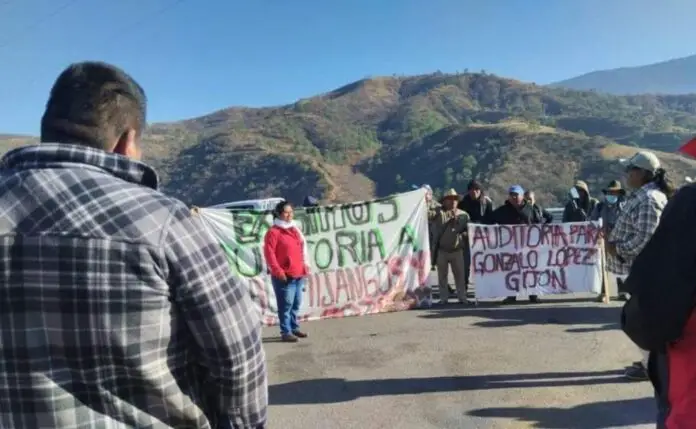The work inaugurated yesterday by AMLO was closed with a checkpoint to prevent passage to units that are not from their community company and at another point to demand an audit of the mayor of San Jerónimo
Not even 24 hours had passed since President Andrés Manuel López Obrador inaugurated the new highway that connects the city of Oaxaca with Puerto Escondido, and reduces the transfer from 6 to 2.5 hours, when commoners who promote a community transport line had already installed a checkpoint to prevent the circulation of other companies.
It is the community line Ruta Coatlanes-Costa S. A. de C. V., integrated by commoners from seven communities that own the lands that cross the highway officially called Barranca Larga-Ventanilla highway, which were expropriated by the federal government in exchange for an economic amount and the promise of millions of pesos in public works.
According to the community company, there are currently 91 partners from the seven communities who demand the “legitimate and exclusive right” to exploit this highway through public transport as agreed with the authorities 20 years ago, since for decades these communities opposed this work until they reached agreements with the populations.
Therefore, the Ruta Coatlanes reported this Sunday that their services have a cost of 300 pesos and start at 4 in the morning, but they warned that the circulation of other transport lines that also announced that they will travel on that highway will not be allowed.
“We notify the companies that are going to run and do not have an agreement with Coatlanes that we avoid problems. They are our lands and we will defend them. We are in full disposition to reach agreements. Long live the 4T First the Poor!”, they warned.
According to the community line, they are the only company that holds agreements with the state and federal governments for circulation on the new highway. The transport company operates through a society of transporters from San Vicente Coatlán, Yogana, San Pedro Coatlán, Santa Catarina Coatlán, San Pablo Coatlán, San Sebastián Coatlán, San José Ceneguilla Coatlán, San Francisco Coatlán, San Antonio Lalana Coatlán, San Isidro Comitlán Coatlán and Santa María Colotepec.
On Monday morning, the commoners of the Coatlanes installed a checkpoint on the Barranca Larga-Ventanilla section where they prevent the transit of units from other passenger lines, such as “Líneas Unidas” under the argument that they are the original owners of those lands, and only allowing the passage to private cars.
To this blockade is added the protest of inhabitants of San Jerónimo Coatlan, who demonstrate in the junction to San Pablo Coatlán, to demand that an audit be carried out on their current municipal president Gonzalo López Gijón, who in the past three-year period served as municipal administrator.
The residents, who carried banners with their demands, also assured that they support the claim of the community transport line of the Coatlanes.
During the press conference of the Oaxacan government, Jesús Romero López, secretary of Government, assured that being a federal highway, it is not the competence of the state authorities to grant concessions or permission to circulate but that it is up to the Federation.
The official said that the state government will help but that it was the secretariats of the Interior and Communications that have already convened a dialogue to reconcile between the companies, including ADO.
“All companies have to enter, no way that the bread is only for one. There have to be services for society, such as transportation,” said Governor Salomón Jara.
Yesterday, during the inauguration of this work that had been expected for more than 15 years, President Andrés Manuel López Obrador announced the cancellation of the toll for one year for the Oaxacans who use this road.
While the fees that visitors from other states and cargo and passenger transport companies will pay, starting in September, will be to maintain the road because it is not concessioned and will be operated by Caminos y Puentes Federales (Capufe).
Official data from the federal government indicate that up to 4,500 pesos per day are expected to travel the 169 kilometers between the capital and the Costa region.
Source: El Universal







